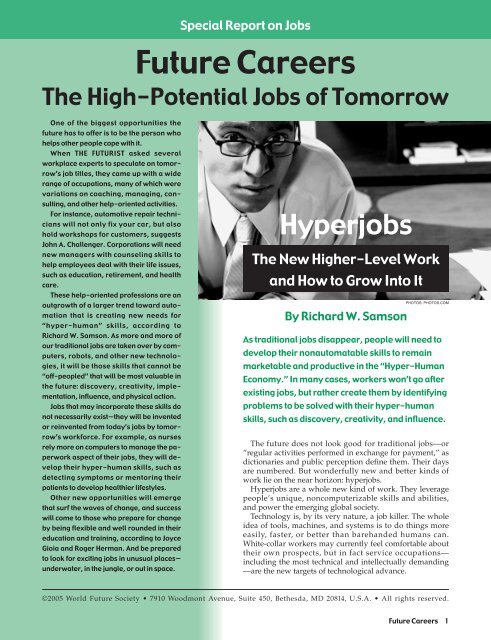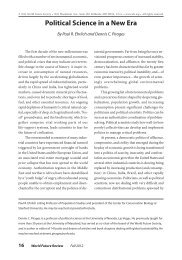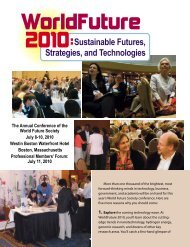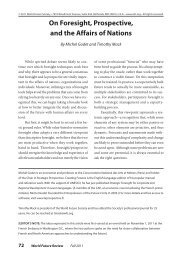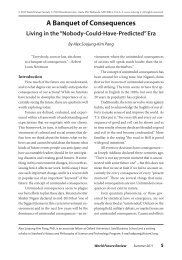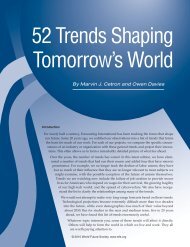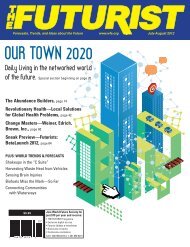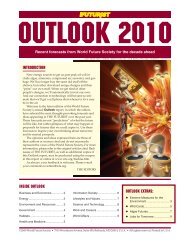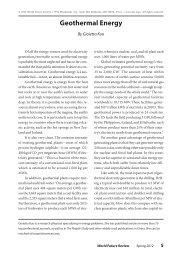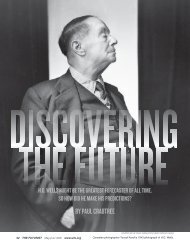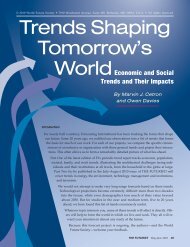Future Careers - World Future Society
Future Careers - World Future Society
Future Careers - World Future Society
Create successful ePaper yourself
Turn your PDF publications into a flip-book with our unique Google optimized e-Paper software.
Special Report on Jobs<strong>Future</strong> <strong>Careers</strong>The High-Potential Jobs of TomorrowOne of the biggest opportunities thefuture has to offer is to be the person whohelps other people cope with it.When THE FUTURIST asked severalworkplace experts to speculate on tomorrow’sjob titles, they came up with a widerange of occupations, many of which werevariations on coaching, managing, consulting,and other help-oriented activities.For instance, automotive repair technicianswill not only fix your car, but alsohold workshops for customers, suggestsJohn A. Challenger. Corporations will neednew managers with counseling skills tohelp employees deal with their life issues,such as education, retirement, and healthcare.These help-oriented professions are anoutgrowth of a larger trend toward automationthat is creating new needs for“hyper-human” skills, according toRichard W. Samson. As more and more ofour traditional jobs are taken over by computers,robots, and other new technologies,it will be those skills that cannot be“off-peopled” that will be most valuable inthe future: discovery, creativity, implementation,influence, and physical action.Jobs that may incorporate these skills donot necessarily exist—they will be inventedor reinvented from today’s jobs by tomorrow’sworkforce. For example, as nursesrely more on computers to manage the paperworkaspect of their jobs, they will developtheir hyper-human skills, such asdetecting symptoms or mentoring theirpatients to develop healthier lifestyles.Other new opportunities will emergethat surf the waves of change, and successwill come to those who prepare for changeby being flexible and well rounded in theireducation and training, according to JoyceGioia and Roger Herman. And be preparedto look for exciting jobs in unusual places—underwater, in the jungle, or out in space.HyperjobsThe New Higher-Level Workand How to Grow Into ItBy Richard W. SamsonPHOTOS: PHOTOS.COMAs traditional jobs disappear, people will need todevelop their nonautomatable skills to remainmarketable and productive in the “Hyper-HumanEconomy.” In many cases, workers won’t go afterexisting jobs, but rather create them by identifyingproblems to be solved with their hyper-humanskills, such as discovery, creativity, and influence.The future does not look good for traditional jobs—or“regular activities performed in exchange for payment,” asdictionaries and public perception define them. Their daysare numbered. But wonderfully new and better kinds ofwork lie on the near horizon: hyperjobs.Hyperjobs are a whole new kind of work. They leveragepeople’s unique, noncomputerizable skills and abilities,and power the emerging global society.Technology is, by its very nature, a job killer. The wholeidea of tools, machines, and systems is to do things moreeasily, faster, or better than barehanded humans can.White-collar workers may currently feel comfortable abouttheir own prospects, but in fact service occupations—including the most technical and intellectually demanding—are the new targets of technological advance.©2005 <strong>World</strong> <strong>Future</strong> <strong>Society</strong> • 7910 Woodmont Avenue, Suite 450, Bethesda, MD 20814, U.S.A. • All rights reserved.<strong>Future</strong> <strong>Careers</strong> 1
Hyperjob holders will spend thebulk of their time engaging in thesoul-invoking activities that haveseldom characterized “work” in thepast, except for the rare Leonardo daVinci or Benjamin Franklin. Theywill more frequently and deeply experiencethe ahas of discovery, thewhy-nots of creativity, and the eurekasof actualizing bold new ventures.They will connect with people moreoften and more deeply and join inbroader, better common purposes.Changes in the FormAnd Nature of WorkThe “job” is, in a realsense, dead, for several reasons.People used to have ajob; now they’re frequently going tohave two or more “jobs” at once,with multiple streams of compensation.They used to work for somebodyelse; increasingly they willwork for themselves, selling theirown products or hiring out theirown services. They used to serve asfunctionaries in the achievement ofpurposes set by others; increasingly,they will set purposes for themselves,or join in setting commonpurposes. And they will rely heavilyon hyper-human skills.While big companies will continueto create new jobs—including jobswith some hyper-human characteristics—bigcompanies are not likely tobe the large-scale mass employersthat they have been in the past. Inthe years ahead, most humans willneed to seek a living outside of thecorporate umbrella.What the Hyperjobs Will BeWhether you’re a student, an employedperson, or a business owner,you face the same burning questions.What will the world need fromme five, 10, or 20 years from now?What will it need from me or mykids at mid-century? What, specifically,are the future “hot jobs”? If thefuture is in “hyperjobs,” what willwe actually be doing?There isn’t any good answer if wethink of “jobs” as income-generatingpositions that companies create andHyper-human skill:IMPLEMENTATIONpost on Hotjobs.com. In the yearsahead, most traditional companiesare likely to focus more on job eliminationthan job creation in order tosurvive in a competitive global market.Tens of millions of new, better jobswill be created, but they will emanatemostly from the jobholdersthemselves. These won’t be jobsyou’ll look for, but jobs you make—jobs that need doing, solving thepressing problems that you areuniquely qualified to solve and thatpeople will compensate you for solving.There are certainly very largeproblem areas that cry out for solutions,and this is where the hottest ofthe hot new jobs will be.• Hyperjobs in Energy. Today,most of our energy is harvested fromoil, which runs—or helps make orbecomes an ingredient of—almosteverything, from tractors that producefood to factories that producetractors. But oil’s time is runningout. Some experts believe global oilproduction has already peaked orwill do so within 20 years.Prices will rise for oil and everythingmade with it or run by it.Shortages will disrupt production,commerce, and transportation, not tomention the global economic andpolitical stability. Imagine Tokyo,São Paulo, or New York withoutpower, transportation, or communicationsfor a week. This will create aneed, obviously, for jobs like policeofficers, emergency medical workers,and soldiers. Less-obvious needswill be to handle explosions, epidemics,and marauding gangs—andthe social/psychological fallout ofsuch problems. Existing jobs, likenanoscientist or investment banker,will also be affected when the sputteringoil engine lets the Internet godark.Clearly a very big hyperjob thatneeds doing is to help promote andparticipate in a massive effort to shiftthe global economy off oil and ontosounder energy. Large numbers ofhyperjobs may be created in thisemerging industrial category. Outsideof direct participation in thealternate-energy business, one keypriority of every hyperjob holdermust be to lend support to otherswho are moving us off oil and ontorenewables.• Hyperjobs in Manipulation ofMatter. All industry and the bulk ofmodern jobs involve manipulation ofmatter by energy directed by livingintelligence. Hyper-human jobs willbe driven by three revolutionarychanges under way in the manipulationof matter, thanks to advancingscience, technology, and generalknowledge.1. The organization of matter to dowork at the micro and nano levels.A whole new industrial revolution isstarting at the microscopic level andsmaller, where individual atoms andmolecules can be manipulated. Man-<strong>Future</strong> <strong>Careers</strong> 3
ufacturing and food productionwill be transformed,as will health care.Hyperjob opportunitieswill abound in the microand nano fields as we beginto explore the manyproblems that these technologiescould solve. The“jobs” won’t already existin such industries; rather, you mayneed to create the opportunities innano fields yourself through interactionwith like-minded researchers,developers, and promoters.2. Enhancement of the humanbody. Current mechanical enhancements—fillingsin teeth, pacemakers,hearing aids, contact lenses—arelikely to be joined in the years aheadby many more parts designed notjust to replace our natural abilitiesbut to extend them. These includecontact lenses and cochlear implantsthat serve as wireless interfaces tothe global Internet, bio-MEMS andbio-NEMS that keep the body wellor reverse aging, and implantednano-bio-computers that extend thebrain’s memory and expand cognitivepowers. The fields of biologicalresearch and health care are likely tointersect intimately with electronicsand software development. Humanbio-enhancement promises to be avery big field with crazy-soundinghyperjob opportunities, such asbioaesthetic coaching, somaelectronic integration,experience design, and personalgenome optimization. To createthe hyperjob you want, networkwith like-minded peers.3. Reconfiguration of both theplanetary and the human ecology.“Matter manipulation” will extendto efforts to eliminate or minimizetwo big culture killers—pollutionand community disintegration. Theworld is in danger of becoming a terminaldump populated by contentiousstrangers. The challenge isto change Earth into a growing gardennurtured by healthy, synergisticcommunities. If today’s nationaleconomies are to survive, pollutioncontrol must become a very big industryin the decades ahead; so mustenterprises engaged in producingfood, products, and transportationHyper-human skill:INFLUENCEthat nourish rather than poison theplanet.These antipollution steps must gohand-in-hand with anti-disintegrationsteps. Community breakdownbreeds social pollution, analogous tophysical pollution and contributingto it. The negative consequences ofcommunity disintegration go beyondcrime, addiction, and terrorism.They include waste and pollution.The impoverished Indian village,the African village suffering ethniccleansing, and the American suburball cry out for sensible redesign.Hyper-human workers will beneeded to breathe new life into communitieseverywhere, creating a neworganizational form—the “intercommunity.”Intercommunities will integratelocal agriculture with lightmanufacturing, services of all types,culture, education, and cyber infrastructure.As a result, the intercommunitycould replace the companyas the dominant economic venue.Look to the intercommunity as a potentialsource of contribution andlivelihood as you move up to hyperworkin the years ahead.• Hyperjobs in “Aliveness”: Shiftingto any kind of hyperwork involvesfocusing on, leveraging, andmagnifying our aliveness as humanbeings—our ability to experienceand enjoy and, most important withregard to work, aspire and transform.To grow into a hyperjob, mostof us need to become much moreself-aware, purposeful, and generallyalive than we now are.Many of us might choose alivenessitself or the enhancement of it as thefocus of our occupational pursuits.Enhancing other people’s alivenessis already a big job category andpromises to get much bigger in theyears ahead, for the need is great.Aliveness enhancementincludes many existing occupations:teaching, coaching,counseling, and ofcourse parenting andgrandparenting. The fieldalso embraces the clergy,entertainers, social workers,and psychologists. Existingjobs in aliveness enhancementbecome hyperjobs to theextent that the full array of hyperhumanskills—discovery, creativity,implementation, influence, andphysical action—are brought to bearon the client.Aliveness enhancement is the“side job,” if not the main job, ofevery hyperjob holder, for alivenessis the whole point of economics,technology, and society. Why else arewe here? The payoff is felt in momentaryrushes of increased joy, perception,discovery, creation, understanding,or love.In any hyperjob in any field, fromteaching to counseling to stand-upcomedy, the drill is the same. Helpother people enhance their fivehyper-human abilities:• Finding things out through discovery.• Coming up with innovationsand new ideas through creativity.• Making good things happenthrough implementation skills suchas planning, organization, action,and persistence.• Positively influencing otherpeople through social skills rangingfrom friendliness and communicationto negotiation and leadership.• Using their bodies and workingwith things through such wide-rangingactivities as gardening, dancing,sports, and food preparation.The drill will also include helpingpeople enhance their skill with thethree enablers:• Seeing things clearly, hearingwhat is said, or venting throughlaughter or tears.• Mastering the ambiguities andrich potentialities of words, numbers,scientific notation, and othersymbols, including musical notation.• Assuming responsibility (a skillas much as a virtue), including sensibilitiesof religion and ethics.4 <strong>Future</strong> <strong>Careers</strong>
Over all, the drill of any hyperjobfocusing on aliveness is simply this:Make other people come morealive—more awake, perceptive, feeling,knowledgeable, wise, and good.You can see it in an instant when ithappens: the suddenly brighter face;the spontaneous laugh; the relaxed,relieved muscles; the enlivened posture;the almost-visible light in thehead; the mystical, momentary rushof “us together.”If your day hyperjob is not in the“more life” meta-category, your sidejob should be. Increased aliveness isthe point of everything.How to Move Up to HyperworkNo one is going to offer anyone a“hyperjob.” You will create it yourselfby exploring areas where problemsabound and needs are clear.Here’s an example of someone whodid just that.In the early1990s, a telecommunicationsexpertquit his jobwith AT&T andbecame an independentconsultant. His income skyrocketed.He loved the new flexibility,and he found himself in demandon the lecture circuit. When the hightechbubble burst, however, hisincome suddenly plummeted asclients such as AT&T and Cisco begancutting back. His lecture businessdropped to near nothing, too.What was he to do?As he looked around him, hefound that some of his neighborshad problems with their computersdue to viruses, adware, and thegrowing complexity of operatingsystems. They asked if he could help.Soon he had a growing business onhis hands: He became a “computerdoctor.”There are four interesting thingsabout this example. First, the consultantconcluded early on that moderncompanies did not offer the securityand flexibility he wanted. So hestopped being an employee and establishedhimself as an independentone-person business. Increasingly,the “new jobs” of the future arelikely to be outside the corporateumbrella.The second interesting thing aboutthis example is that, when the consultant’stelecom business dried up,he went back to basics and marshaledhis creativity. He asked,“What am I good at? What am I herefor? Who needs me?” And he explorednew avenues.As technical, business, and socialchange accelerate, we’re all going tohave to hone our skills of reflectionand reinvention.Third, the consultant’s new successful“job” is not one currently recognizedby established authority.There is no “computer doctor” listedin the U.S. Dictionary of OccupationalTitles. Furthermore, when Ientered “computer doctor” in thetwo leading job databases, Monster.comand Hotjobs.com, not asingle listing turned up. But when IHyper-human skill:PHYSICAL ACTIONentered “computer doctor” in Google,there were 40,400 hits. Lots of people,like the telecommunications consultant,have discovered the new needand are filling it. Today, the job sceneis changing so fast that it’s leavinggovernment trackers—and evencompanies that create jobs and lookfor people to fill them—behind thecurve. The best “job indexes” havebecome search engines and the dailynews (if you read between the lines).Fourth, the consultant operatedwith responsibility at the forefront ofhis consciousness and behavior. Thekey to his success as a computer doctorwas trustworthiness. “People recommendme,” he says, “not justbecause I fix the problem and don’ttry to gouge people, but because I’mthe kind of person who can betrusted alone in the home with thewoman of the house.”The above example illustrates creatinga hyperjob out of nothing but aneed. There’s another good way tocreate one: upgrading a job you’vealready got.Change an Existing JobInto a HyperjobThere can be hundreds of millionsof hyperjobs, because virtually anyjob can be converted into a hyperjob.The process is simple, involving twosteps:Step 1: Automate as much of yourexisting job as you can. Systematizevia paper, procedure modification, orconversion to electronic processing—just so you don’t have to do as muchwork anymore. In effect, tell the robotstrying to take over your job:“You’re hired. Now here’s what Iwant you to do.”Step 2: Upgrade the hyperhumanaspects of the job. Reviewthe list of five key skills and three enablers.Envision where you could applymore creative thinking, or applysome discovery to find why certainthings go wrong, or improve your influencethrough better communications.Consider taking on more responsibility,or improving the qualityof the responsibility you alreadyhave by living up to promises morereligiously.We can’t all be nanotech researchers,and not many of us wantto. The world we want and cancreate has room for all orientationsand preferences: people who likeworking with their hands more thanwith their minds, or who like workingwith other people more thanwith new ideas. The hyperjobs ofour future embrace all of these diversities.The relevant hyper-humanskills—even for those who like to<strong>Future</strong> <strong>Careers</strong> 5
work with things—are safefrom automation if pursuedwith self-awareness.Even a job bound for electronicreplacement, such asgrocery checking, may beconverted into a hyperjobthrough the one-two approach.First, the clerk wouldgo with the automation flow:find ways to get her job donewith less time and effort andhelp introduce electronic efficienciesbrought in by management.Then the clerk (assumingshe still has her job)would use her newfoundtime to exercise her hyper-human attributes.She would increase herlevel of friendliness and helpfulnesswith customers, ask her boss for newduties and responsibilities, use discoveryand creativity to troubleshootproblems in the store and think ofimprovements to recommend.Any existing job—from receptionistto CEO, accountant to zoologist—can be moved higher on the hyperhumanscale. The initiative lies withthe people most able to instigatetransformation: the jobholders themselves.Hyperjobs Now EvolvingHow Jobs Are ChangingTypical Job of Yesterday• One job (singular) per worker.•Employed by a company.• Functional.•Rely on specialized skills such asaccounting or engineering.• Compensated by money.Typical Hyperjob of Tomorrow• Multiple simultaneous “jobs.”• Self-employed.• Purposeful.•Rely on hyper-human skills such as discovery,creativity, and responsibility.• Compensated by money and also byother forms of social exchange ranging frombarter to “time dollars.”The hyperjobs of the future maybe either entirely new or enhancedversions of existing jobs. If enhancedversions, they may retain the samenames as today’s counterparts, ordifferent names. In all cases, thefuture jobs themselves will likely bequalitatively different, with a moreintensehyper-human emphasis. Afew examples:•A nurse may still be called anurse, but may have offloaded paperworkand improved her symptomdetectionskills.•A new position, health-enhancementmentor, may be created, formalizingand enhancing what manynurses do today.• Surgeons could become extinct,replaced by surgical robots, but enjoynew occupations as surgical proceduredevelopers.• Similarly, the new computer doctorscould be replaced by computerdoctorsoftware; former computerdoctors could become computerdoctorprocess developers.•Today’s college classes coulddisappear, along with testing administeredby college professors. But thetitle “college professor” could persist,standing for the person who organizesin-depth discussions, adviseson paths of learning, and givesfeedback on research projects.• Family farmers could continueto disappear, but a new job categorycould materialize: intercommunityfarmer, one who provides fresh producegrown within walking distanceof residents. (Urban farmer is alreadya small but promising category.)Hypercareer PlanningFor those wishing to target afuture career, I recommend the followingfive-step process:1. Decide which of the five keyhyper-human skills—discovery, creativity,implementation, influence, orphysical action—fits you best. Planto center your training and hyperjobcreation on one of these, not in atraditional specialty such as chemicalengineering or English literature.Specialized knowledge, while stillimportant, will be subservient to theenduring, hard-to-automate hyperhumanskills.2. Determine your overarchingvocation and purpose. Decide whichof the big, vital problem-opportunityareas you want to tackle—energy,matter manipulation, or aliveness.Find the place where the needand your potential contributionintersect. And remember,your best efforts are vital, forthe world really does needsaving.3. Create relevant streamsof compensation. If you needmoney, you may have toscrounge and compromise,but don’t let that deflect youfrom your larger purpose. Almostany activity, no matterhow mundane, can be upgradedto a fulfilling, valuablelevel by an infusion ofhyper-human energy. Do twoor more “jobs” at once if possible.Embrace unconventional forms ofexchange involving collaborationand sharing.4. Be flexible as you move intomultiple “jobs.” Remember the twostepprocess: Offload everything youcan to automation technology, thenenhance your hyper-human focus.The new jobs will move into and outof currency much faster than yesterday’sjobs. They will be more liketasks or projects than jobs. The bestapproach is to get each thing masteredand “on automatic,” then moveon in the pursuit of your overall purpose.5. Participate in social change atthe community, national, and globallevels. Individual action, thoughvital, won’t work in a vacuum. Privatesuccess and wealth cannot survivegeneral societal disintegration. ■About the AuthorRichard W. Samson is directorof the EraNova Institute,Mountain Lakes, New Jersey07046. Telephone 1-973-335-3699; e-mail dicksamson@eranova.com; Web site:www.eranova.com.This article draws from a book on hyperjobsthat he is now completing and from hispublished book, Mind Over Technology:Coming Out on Top as a Wired <strong>World</strong> Startsto Run on Automatic (Global Book Publisher,2004). Order from the Futurist Bookshelf,www.wfs.org/bkshelf.htm.His previous article for THE FUTURIST,“How to Succeed in the Hyper-HumanEconomy,” appeared in the September-October 2004 issue.6 <strong>Future</strong> <strong>Careers</strong>
Working in the <strong>Future</strong>How Today’s Trends AreShaping Tomorrow’s JobsGlobalization, aging, and trends intechnology and society will createopportunities for Eco-Relations Managers,Retirement Consultants, andOutsourcing Coordinators.By John A. ChallengerThe workplace is constantly evolving. Over thelast 50 years we have seen radical changes in wherewe work, how we work, and when we work. Thesechanges are most readily evident in the job titlesthat have dramatically evolved over the years.In just the last decade or so, the dot-com, neweconomy era brought with it a plethora of new jobtitles, reflecting the nontraditional managementstyle these entrepreneurial ventures tried to create.Unique titles such as envisioner (Design ContinuumInc., 2000), idea ambassador (2think Inc., 2001), and directorof first impressions (Teltronics Inc., 1999) wereregularly featured in the pages of Fast Company, apublication chronicling the new economy. Some ofthe more mainstream job titles that have surfaced inrecent years include chief information officer, kernel engineer,and network security specialist.Job titles will continue to evolve over the next 20years as numerous trends alter the workplace landscape.Trends in technology, society, demographics,and the economy will inspire the job titles of tomor-PHOTOS: PHOTOS.COM<strong>Future</strong> <strong>Careers</strong> 7
ow. The following are our top 10candidates.Manager of DiversityUntil recently, this executive mighthave been in charge of making surethe company’s payroll met diversitystandards and enforcing policies thatensured no group would be treateddifferently or affected adverselybecause of skin color, gender, religion,etc. Today, companies are movingbeyond the idea that diversityinitiatives are simply the politicallycorrect thing to do and have come torecognize the business benefits ofhaving a multicultural workforce.The overall U.S. population is becomingmore and more ethnically diverse.Having an equally diversepayroll means having employeeswho can literally and figurativelyspeak the language of the customers.Hispanics, in particular, accountedfor about one-half of U.S. populationgrowth between July 2003 and July2004. According to the U.S. CensusBureau’s most recent estimates, approximately14.3 million Hispanicslive in the United States.The manager of diversity will becharged with getting the maximumbenefit out of individuals’ uniquetraits, helping employees develop aculturally informed approach to customerservice, and tapping new potentialmarkets. For example, themanager of diversity might becharged with spearheading a marketinginitiative in an up-and-comingLatino neighborhood, or conductingWeb-based product surveysthrough popular Web sites in China,Latin America, and the Middle East.This manager might also develop avisiting-worker outreach center toassist employees from other countrieswith translation issues, find affordablehousing, obtain citizenship,or find low-cost language instruction.Offshore Outsourcing CoordinatorOffshore outsourcing is one of themore controversial trends in today’sworkplace. Regardless, that trend islikely to continue for the foreseeablefuture. According to the InformationTechnology Associationof America, spending onglobal outsourcing in thefields of computer softwareand services is expectedto grow to $31 billionby 2008. More thanhalf of the new jobs createdin that field will gooffshore. The U.S. economyis expected to create516,000 new jobs in thesoftware and servicesarea within the next fiveyears. Of those 516,000 jobs, as manyas 272,000 are also expected to go outof the United States.While the practice of outsourcingis thought by many to be a destroyerof American jobs, it is likely to createmore jobs than it eliminates. A growingnumber of economists agree thatoutsourcing contributes to increasedproductivity and helps keep inflationin check. Higher productivityand lower prices for goods will helpthe economy create new jobs. TheBureau of Labor Statistics has estimatedthat total employment islikely to increase from 144 millionjobs in 2002 to 165 million by 2012,largely as a result of outsourcing.One job that may be created is thatof offshore outsourcing coordinator.Companies cannot simply contractwith an overseas service providerand then sit back while key decisionsare made without them. Firms thatchoose to outsource services musthave a representative on hand to ensurethat outsourcing providers aremeeting certain standards, that thework is being done to everyone’ssatisfaction, and that customer servicedoes not suffer. The outsourcingcoordinator will also look for newoutsourcing opportunities and willassess the costs and benefits of each.This person may also be in chargeof assisting workers whose jobs havebeen dissolved or moved abroad. Heor she may set up a displacedworkerinsurance fund to providedownsized workers with a financialcushion during their transition period,to augment unemployment insurance.The coordinator could alsodevelop a retraining program to helpdisplaced staff prepare themselvesU.S. Jobs Created and DisplacedThrough OutsourcingCumulative Number of Jobs600,000500,000400,000300,000200,000100,00002000 2001 2002 2003 2004 2005 2006 2007 2008Non-IT and IT Jobs Created IT Software and ServiceJobs DisplacedSource: Global Insight, Inc.for the new jobs that the economywill create.Corporate Age AdviserWith a growing number of individualsover the age of 65 comingback to work, companies will soonsee the age range of their workersspan four generations. According tothe U.S. Bureau of Labor Statistics,workers over the age of 55 are expectedto grow from 14% of the laborforce to 19% by 2012.Having such a diverse workforcewill prove beneficial for organizationsthat are able to manage the differentwork styles of each generation.Companies that fail to do this,however, may see age conflicts develop,which could, in turn, lead to adecrease in productivity.To help companies manage thedelicate balance between generations,a new breed of consultant willemerge: the corporate age adviser.This consultant will mediate disagreementsbetween age groups, ensurethat each department has theright mix of generations to achieveits goals, and increase the harmonybetween groups. A corporate age advisermight also be in charge of recruitinga customer-service team tomarket to the age 65 and older demographic.The age adviser will bein constant negotiation with powerfulseniors groups like AARP, bothon the national and chapter level, toobtain product endorsements andnegotiate promotional partnerships.Retirement ConsultantIn less than five years, 77 million8 <strong>Future</strong> <strong>Careers</strong>
aby boomers in the United Stateswill begin reaching age 65, thetraditional retirement age. Already,the concept of retirement is undergoinga radical evolution. While manyAmericans will be financially preparedfor their later years, not all ofthem will be emotionally ready forthe transition. Many people reach retirementand discover that readingor playing golf is not as appealing asit once seemed. New business opportunitieswill arise as advances intechnology elongate the human lifespan and the percentage of the populationaged 65 and older continuesto grow. One of those new opportunitieswill be the field of retirementconsulting.Such a service will be in high demand,especially in dual-incomehouseholds where both partners retirearound the same time. The adjustmentof going from a situationwhere both individuals are workingto where both are retired will be difficultto manage. Retirement consultingprofessionals will help thesecouples cope with the changes anddiscover what they want to do intheir retirement. This consultantcould provide valuable advice on arange of issues, from stretching andgrowing a fixed-income account togetting the most out of one’s freetime. The retirement consultant mayhelp an individual determine if he orshe was well suited for entrepreneurshipor volunteer work. If theclient is looking toward a careerchange, the consultant could helppoint toward the most suitable “retirementcareer.”Automotive Repair TechnicianThe era of the archetypal, not-sovery-brightcar mechanic is officiallyover. The average new automobilefeatures more onboard computerizationthan the Apollo 13 spacecraft.Cars like the Infiniti FX feature navigationsystems that instantly providetraffic data and offer alternativeroutes. In the near future, more carswill come equipped with assistedbraking that will automatically slowthe vehicle when it gets too close toanother.Tomorrow’s automotive repairtechnician will have to be computerliterate in addition to being highlyskilled in the fundamentals of automotiverepair. He or she will need toknow how operate complicated computerdiagnostic programs and befamiliar with an enormous variety ofmachines and parts. Entrepreneurialcar technicians in the future will dialoguewith car companies to get thebest prices for computer upgrades inthe same way that auto garages todayoften compete to get the bestdeal on parts from manufacturers.<strong>Future</strong> car technicians might alsohold workshops to teach customershow to use the newest in-car softwareas it becomes available.Corporate HistorianCorporations, like people, havememories. Just as our memories determineour personality, inform ourgoals, and influence our direction inlife, the same is true for corporations.A company’s memory comprisesthe collective business experiences,dramas, visions, successes,and failures of real people who workfor the firm. Companies draw oncorporate memory’s lessons eachtime they solve problems, sell productsand services, interact with customers,develop new technologies,or design marketing campaigns.As more workers reach the officialretirement age in the coming years,companies both large and small willface the prospect of a serious memorydrain. To prevent this, firms willneed an ongoing and detailed recordof projects, programs, problems, solutions,results, etc., in a computerizeddatabase. When future problemsarise, a corporate historian willcross-reference the database for similarcases and create a report containingpossible strategies and outcomes.The system will be especially helpfulas more companies expand nationallyand internationally. For example,a plant manager in Mexicofacing quality-control problems mayaccess the memory database andfind that a similar problem occurredin Singapore. That plant managerwill be able to consult a detailed reportof every action that was undertakento diagnose and fix the problem.Such a report might eveninclude a list of outside contractorsthat were called to resolve the issue,and a review of each contractor’sperformance. The corporate historianwill ensure that the informationin the report is relevant, accurate,and easily accessible.Chief Health OfficerAs corporate health-care costs continueto spiral out of control, manycompanies will consider abandoningemployer-sponsored health insurance.Every company, regardless ofthe coverage they offer their employees,has a financial interest in keepingtheir workers as healthy as possible.Unscheduled absenteeism or“sick days” cost employers an averageof $610 per employee every year(2004 CCH Unscheduled Absence Survey).In the future, more companieswill insist that their workers followcertain health practices in order tohelp contain these expenses. OneMichigan company has already establisheda policy forbidding itsworkers from smoking—even off thejob. Other companies are encouragingemployees to lose weight and exercisemore. Some companies havewell-equipped exercise areas.An in-house health-care officercould oversee a variety of corporatewellness programs. The officermight rewrite the company’s healthinsurancepolicy to account for demographicshifts that occur withinthe company over time. He or shemight also conduct longitudinalstudies to pinpoint the sorts of illnessesthat the company’s employeessuffer from most frequently, andthen make appropriate recommendationsto management. The officermight manage a small staff, includinga corporate nutritionist and apersonal training professional.Eco-Relations ManagerCompanies are finding out that itpays to be green. According to thegroup Lifestyles of Health and Sus-<strong>Future</strong> <strong>Careers</strong> 9
tainability, the U.S. market for sustainableproducts and services wasestimated at $76.5 billion at the endof 2004. In an effort to tap into thismarket, General Electric recently announceda new initiative dubbed“ecomagination” that will focus onthe research and development ofeco-friendly products and services.Both Republican and Democrat leadersare eager to help private enterprisedevelop greener products andpractices. The Bush administrationhas called for tax incentives totaling$4 billion through 2009 to promotecleaner and more energy-efficienttechnologies.The payoff of a greener economycould be substantial in terms of newjobs. A study by the Wisconsin EnergyBureau concluded that investmentin renewable energy createsthree times as many jobs as the samelevel of spending on fossil fuels.One job that could result is that ofeco-relations manager, who will coordinateefforts to seek eco-friendlypolicies, products, vendors, etc. Thisperson will communicate and workwith consumers, environmentalgroups, and government agencies todevelop and maximize ecologicalprograms. For example, an ecorelationsmanager might conductenvironmental-impact surveys priorto the construction of new companyfacilities. He or she might work withCongress to acquire federal grants tohelp the company meet new fuelefficiencystandards. This managerwould also arbitrate between suppliersto find the best price for energysavingdevices, such as photovoltaicsolar panels or bulk recycled material.Manager of Faith-BasedRelations and InitiativesThe Manager of Faith-Based Relationswill work to ensure that the demands ofwork don’t interfere with the demands ofreligious faith, and vice-versa.As business becomes increasinglyglobal, companies are encounteringa growing diversity of religions. Insome areas of the world, religion canplay a powerful role in consumerhabits.Even in the United States, conservativereligious groups are gainingpower and are more willing to flexthat power to influence political aswell as consumer behavior. PresidentBush has made faith-based andcommunity services a centerpiece ofhis administration. Faith-based organizationsreceived $2 billion infederal funding in 2004.As religious groups use the powerof their growing numbers to effectchange, companies with religiouslydiverse workforces will have to establisha special representative towork with these parties to ensurethat lines of communication remainopen.The manager of faith-based relationswill work to mediate the demandsof work and religious faith.He or she will also seek out newbusiness opportunities connected toreligion in society. This managermight also oversee how companygoods and services are marketedabroad, especially in places like theMiddle East where the decision ofwhat product to market is as importantas the manner in which thatproduct is marketed. Another job forthis manager might be organizingvolunteer information sessions tohelp employees better interact withtheir colleagues of different religiousbackgrounds.Coordinator of WorkforceDevelopment and ContinuingEducationSevere labor shortages are likely toreturn in the next decade. Somecompanies may begin feeling thepinch within the next few years. Certainindustries, such as health care,are already suffering.Ironically, even as society becomesmore dependent on technology, companiesin the future will face a shortageof technologically skilled workers.Fewer young people now entercollege on a technology-orientedtrack. A survey of colleges foundthat enrollment in key courses forcomputer science majors was downanywhere from 10% to 30% in 2002.The skills gap will be evident notjust in tech, but in all aspects of businessas students continue to lackproficiency in written and verbalcommunications, organizationalskills, and problem solving.Employers have a vested interestin making sure that there are jobsand skilled workers to fill them domestically,if for no other reason thanthat these companies rely on thosesame workers to consume theirproducts and services. This is wherethe coordinator of future workforcedevelopment and continuing educationwill assist.This coordinator might manage aprogram to help qualified employeesattain advanced degrees in theirareas of specialty. He or she wouldrun a series of Web-based informationsessions to teach employeeshow to use the latest software, or organizea “tech retreat” for the samepurpose. Finally, the coordinatorcould manage a “virtual internship”program to tap talented youth acrossthe world and expand the company’stechnological knowledge base.Business as a whole can work toclose the skills gap by contributingto school-to-work programs, particularlyprograms reaching down to theelementary-school level. Unfortunately,federal funding that helpscommunities establish such programshas been cut in recent years. Suchprograms will be instrumental indeveloping the future workforce. ■About the AuthorJohn A. Challenger is chiefexecutive officer of globaloutplacement firm Challenger,Gray & ChristmasInc. From 1999 to 2002, heserved on the Labor andHuman Resource Committeeof the Federal Reserve Bank ofChicago. His address is 150 South WackerDrive, 27th Floor, Chicago, Illinois 60606.10 <strong>Future</strong> <strong>Careers</strong>
Career Planning for the21st CenturyPHOTOS.COMBy Joyce Gioia and Roger HermanA liberal arts degree, a varied background,and a willingness to learn new things maybe the best preparation for the job marketof tomorrow.Many of today’s young peoplewill hold jobs in their lifetimesthat don’t even existtoday. The best preparation is probablya formal liberal arts educationcombined with skill and specialtydevelopment through internships,work, or other nonacademic experiences.Job candidates with broad, interdisciplinarybackgrounds havebecome increasingly attractive toemployers, and this trend is likely tocontinue in the future as more professionalsare called on to performan increasingly expanding range oftasks. Students in the liberal arts willbe uniquely suited to these loomingchallenges, having developed a familiaritywith a wide variety of ideasin both science and culture. Thisbroad worldview will enable them tounderstand the relevance and contextof seemingly disconnectedideas. These well-rounded workerswill possess a nice mix of hard skillsand soft skills, which they will applyto tasks ranging from delicate negotiationswith people from othernations to daily interaction withcomplicated equipment and computerprograms. All ofthese skills will be essentialin the job market oftomorrow.What Will the JobMarket Look Like?Indications are that theeconomy will continue togrow in the United Statesand around the world for atleast another decade. Accordingto the Bureau of Labor StatisticsOccupational Outlook Reportfor 2005, the U.S. economyis expected to add 21 millionjobs by 2012. In the near term,jobs will continue to move fromplace to place, and so willworkers. New jobs will be createdat a rate that will giveworkers a variety of choicesabout where they work andwhat kind of work they’ll do.The <strong>World</strong> <strong>Future</strong> <strong>Society</strong>’s 2005“Outlook” report states that thefastest-growing field will be professionaland business services, whichare expected to gain 5 million newjobs by 2012. At the same time, low-<strong>Future</strong> <strong>Careers</strong> 11
INDRANIL MUKHERJEE / AFP / GETTY IMAGESskilled and menial jobs in areas likemanufacturing and mining will facecontinued threats from outsourcingand automation. In the last decade,almost 10 million low-skill manufacturingjobs were lost due to automation,according to Harvey Cohen ofthe research firm Strategy Analytics.In other words, just as the economywill create new opportunities for employment,many jobs will be lost.Workers will have to be wary.Some occupations will change inname only. As we continue to movedeeper into what may be the mostsevere shortage of skilled workers inhistory, clever recruiters will becomeincreasingly anxious to fill vacantmission-critical positions. They willapply new names to old jobs in effortsto attract applicants. In the past,job titles such as mobile accumulationsanitary engineer have been appliedto people who ride on the back ofgarbage trucks, and sewer workershave been reclassified as subterraneanengineers. Competition for talent—oreven warm bodies—will force employersto manipulate job titles inways that will be surprising.Other jobs will evolve graduallyuntil they no longer resemble theircurrent predecessors. These incrementalchanges will be unnoticeableand will occur mostly in response toslight changes in the expectations ofsuperiors, customers, or workers.Some of the modifications will bedriven by technology, changing theway tasks are performed, if they’restill performed at all. The same technologicaladvances that eliminate theneed for some jobs will create newneeds for creativity or mechanicaland operational know-how.Some changes will be more radical.New positions will be created todo work that has never been donebefore. Most of these jobs will developin response to shifts in themarketplace or due to advancingtechnologies.An example of these new jobs isthe U-Scan operator, the person whosupervises customer use of selfcheckoutstations at supermarketsand retail stores. This technologicaladvancement has eliminated manycashier positions, while creating anew, more highly skilled occupation.The IHL Consulting Group has suggestedthat sales for such self-servicescanning devices will grow to $330billion in the next two years. Whilecheckout personnel might havecause to be nervous about their jobprospects, U-Scan operators can lookforward to a more secure future.Such radical changes will havetremendous influence on howpeople work. As we contemplatethese future career opportunities, itis important to consider how the jobfits in the employment marketplace,what characteristics and qualificationswill contribute to high performanceand job satisfaction, andwhat preparation will be requiredbefore applicants are qualified forthe positions.More employment choices in theyears ahead will be based on values.Both workers and bosses will belooking for the ethical “why” behindeach task, each decision, and eachpolicy. As we observe workforcetrends, we see this attitude becomingmore prevalent. Having the rightpeople onboard is not enough. Thosepeople need to be there for the rightreasons, too.Competition for talented workerswill empower people to choose theirjobs, their employers, their location,and even how and when they willwork. The sellers’ market for laborwill give sought-after specialists theprivilege of designing their jobs to fittheir preferences, leaving the employerto modify other roles to adjustthe distribution of tasks. Theworkers of tomorrow will need to beas versatile as they are hard working,and as creative as they areknowledgeable.Here is a sample of the types ofjobs we are likely to see in comingyears.Telemedicine TechnicianThis individual will serve as partof a multi-site team to provide medicaldiagnosis and treatment topeople in remote areas. They willtravel, sometimes with minimal notice,to isolated areas around theworld. They will operate auxiliaryThe First Global Work Process Coordinator?Microsoft CEO Steve Ballmer (left)meets with Nandan Nilekani (right) of theIndian Company Infosys to negotiate an $8million service partnership deal. In thefuture, global work process coordinators willarrange offshore service contracts frequently.medical equipment under the supervisionof medical doctors and willprovide primary and secondary carefor a wide range of routine andtrauma patients. They will be trainedin operating digital equipment andcommunications gear, and will communicatewith base stations viasatellite.Qualifications and preparation: Potentialapplicants for this job willneed to complete four-year degreeprograms at an accredited universityand pass a battery of tests on healthcareand electronics. Experience inthe field of military medicine, particularlywith an airborne, paratrooperunit, would be a plus.Telemedicine Support AssistantsThese workers would assist telemedicinetechnicians in their fieldwork.These assistants would be proficientin using global positioningsystem (GPS) technology and satellitebasedcommunication devices, andthey would have associate degrees inparamedicine, electronics, or spacebasedcommunications.Global Work ProcessCoordinatorUsing computer databases, modeling,and real-time interactive filedirection software, these professionalswould coordinate the activities offreelance and staff work teamsthroughout the world. This positionwould involve project management,negotiation, problem solving, andthe ability to respond quickly to12 <strong>Future</strong> <strong>Careers</strong>
global developments. Foreignlanguage fluency, particularlyin Chinese, Ukrainian, andSpanish, would help these individualsa great deal.Qualifications and preparation:Global work process coordinatorswill possess four-year degrees inliberal arts with concentrations ininternational studies.Chief Innovation OfficerThis worker will function at thehighest corporate levels and will reportdirectly to the chief executiveofficer, chief operating officer, orchief strategy officer. He or she willinteract with employees throughoutthe organization to research, discover,design, and apply creativeideas to improve business processes,products, and services for the companyor its customers. This professionalwill be particularly proficientin creative thinking, have an out-ofthe-boxattitude, and will feel comfortablechallenging the system.Qualifications and preparation: Thechief innovation officer will have afour-year degree in liberal arts froma nontraditional or liberal arts college.Additionally, he or she mayhave led a number of both successfuland unsuccessful entrepreneurialventures and may have a reputationfor being “wild.”Executive Chef, Space AirlineHO / KRTThis person will design menus ofbalanced, nutritious meals for thecrew and passengers of commercialspace airlines. Squeezing food fromtubes will not be enough; futurespace airlines, such as Richard Branson’sVirgin Galactic, will have tocater to a world-class clientele accustomedto high-quality fare. Thechef’s creations will be judged forvariety, attractiveness, and ease ofeating in both weightless and artificial-gravityenvironments.Qualifications and preparation: Theexecutive space airline chef will havegraduated from an accredited culinaryarts school and will have atleast five years of experience as anexecutive chef. He or she will understandthe dynamicsof foodconversion to spacefriendlyconfigurations and befamiliar with the peculiarities ofzero-gravity or low-gravity environments.Portable Benefits AdministratorThis information managementspecialist will serve as an intermediarybetween individuals and familieswho hold benefits contracts andthe companies that supply benefitsservices to them. The administratorwill preapprove claims and crosscheckpost-event records with confirmedapprovals for accuracy,accountability, and cost control.Additionally, this person will educateconsumers about their optionsand work with them to reduce insurancepremiums.Qualifications and preparation: Ahigh-school diploma will be requiredfor this position, though employerswill surely favor candidates with associateor bachelor’s degrees (liberalarts). Candidates for this job willneed to demonstrate knowledge ofthe use of computers to managerecords, processes, and communication.They will require the ability tolearn about special areas of insurancecoverage and financial planning,including dental, vision, pension,investment, legal services, petcare, etc.Vice President of ExperiencesThis imaginative individual willdesign and implement processes andsystems to create positive experiencesfor the organization’s internaland external customers. These experiencesmay include presentations atconferences and trade shows, mediaevents, or interactive Web sites. Successfulcandidates for this positionThe M400 Skycar is the result of 30 years and$100 million worth of research and development.<strong>Future</strong> skycar mechanics will have to be wellversed in both automotive and airplane repair.will use the precepts ofconsumer behavior andleading-edge research onsensory applications tocraft extraordinary experiencesthat add value tothe relationships thatconsumers and employeeshave with the organization.Qualifications and preparation: TheVP of experiences will need a fouryearcollege degree in liberal artswith a major in psychology, sociology,or anthropology. He or she willneed at least five years of marketingexperience within a consumer-orientedservice organization. A master’sdegree in consumer behaviorwould definitely come in handy inthis position.Skycar MechanicThese technicians will provideroutine and problem-responsive serviceto ground–air vehicles anywherein the world on scheduledand as-needed bases. These professionalswill apply their knowledgeand skills using satellite-based computerizeddiagnostics to assure safeand secure operations under aviationlaws and guidelines.Qualifications and preparation: Potentialskycar mechanics will requirean associate degree in jet engine mechanicsand a minimum of five yearsof experience repairing small jet aircraft.They will also need to befamiliar with troubleshooting forsatellite communications systemsand have a previous background inautomobile mechanics.General Manager,Underwater HotelThe general manager will lead ateam of carefully chosen departmentheads in the day-to-day operation ofa major hotel functioning in totallyself-contained and highly unusualenvironments—namely, under thesea. Patrons of this hotel will expectan extremely high level of service tojustify the large bill. The general<strong>Future</strong> <strong>Careers</strong> 13
SYSTEM MODERN GMBHmanager will be responsiblefor making sure that room serviceis prompt and efficient,that the rooms are comfortableand clean, etc. Additionally,the general manager will haveto constantly ensure the safetyof the hotel’s guests in a verydangerous environment.Qualifications and preparation: Theunderwater hotel manager will havegraduated from an accredited hotelmanagement school and will probablyhave an MBA with a concentrationin interpersonal leadership techniques.This individual will havesignificant experience in managingprogressively larger hotels, includingat least two years managing five-starhotels. He or she will likewise haveexperience running at least one commercialproperty in a threatened orprotected environment. Militaryleadership experience would be anasset to this person, as well as abroad language base.Facilities Engineer,Underwater HotelThese professionals will managethe internal and external environmentsof underwater facilities, aswell as all the daily maintenancetasks associated with large hotels.Qualifications and preparation: Theseengineers will have at least an associatedegree in maintenance engineeringand at least five years of progressiveexperience in that field or itsequivalent. Employers will give preferenceto candidates with a certificationin facilities management (CFM)from the International FacilitiesManagement Association and willrequire candidates to have certificationas a facilities management professional(FMP).Personalized EntertainmentProgrammerThe Hydropolis, an underwater hotel, is scheduledto open in 2006 off the coast of Dubai.These professionals will designmultimedia entertainment sequencesto meet specific needs. They will bewell versed in using audio/visualsystems found at workplaces, retailenvironments, or high-noise environmentssuch as airports or manufacturingfacilities. They will use anintimate understanding of their customers’preferences to create personalizedentertainment broadcasts.These broadcasts will then be transmitteddirectly over headsets,surround-sound systems, residentialenviro-sound systems, or embeddedchips. This job will involve consultingwith customers and using menubasedcomputerized programming,and will also require an understandingof satellite transmission technology.Qualifications and preparation: Personalizedentertainment programmerswill possess at least one year ofexperience in broadcast or cable programmingor have related experiencein audio, video, or experientialorientedentertainment in anemployment environment. Many ofthem will also have a great deal ofnovice or amateur experience in creatingpersonalized broadcasts orpodcasts. They may also have an associateor bachelor’s degree in entertainment,cultural studies, art, literature,or music appreciation.Jungle Officer, Clearance andMaintenanceThese individuals will provideprotective support for scientists,road builders, developers, explorers,or missionaries moving through unchartedterritory, particularly inAfrica or South America. They willbe responsible for blazing routes andprotecting their clients from real andpotential human, animal, and plantantagonists. Maintenance officerswill be subject to long assignments,perhaps three to six months, keepingcleared areas, transportation corridors,and work sites safe and secure.Qualifications and preparation: Inaddition to being in excellent physicalcondition, these individuals willpossess combat or wildfire experience.Many of them will be “hotshot” veterans with a Special Forcesbackground. The ability to learn newtechniques, technologies, and languageswill be must-have skills forthese individuals.Director of InfluenceThese professionals could be describedas the ultimate “schmoozers.”Their duties will range fromprotocol management and entertainingto coaching teams or individualsin persuasive sales techniques toclose deals. In some companies, thisposition could be handled fromhome offices. In other organizations,the director of influence will travelextensively, with a work pattern similarto the secretary of state. Some ofthis person’s work will be highly visible;other work will be covert, withfew people in the executive suiteeven knowing that something is happening.Qualifications and preparation: Abachelor’s or master’s degree in liberalarts will be exceptionally helpfulto this person, who will probablyneed experience in high-level salesand be gifted at expressing intangibleconcepts in clear, concise, andcompelling language. Diplomaticservice will also help qualify candidatesfor this position, particularly ifthe work includes sensitive operations,complicated negotiations, ordifficult relationships. These professionalswill have to be articulate in atleast one foreign language.Corporate Alumni DirectorThis person will maintain relationshipswith former workers to attractboomerang employees and qualityreferrals. One duty might be to setup a reemployment counseling programto retain workers who have leftthe firm to pursue important personalgoals—such as parenting—andhelp them remain up to date and inthe loop on company policies and directives.This will better enable employeeswho must take extended absencesto return to the companiesthat most desperately need them.These directors will understand14 <strong>Future</strong> <strong>Careers</strong>
multi-phasic interactive relationaldatabase management, and will beskilled at electronic relationshipbuilding. They will have good interactiveskills and will coordinate withmarketing and human-resource departmentsfrequently. They will alsooperate indirectly with collegerelationspersonnel to connect alumni.Qualifications and preparation: Abackground in administrative marketingand/or sales experiencewould be helpful in this position, aswould an associate degree. This personwill require excellent communicationskills and the ability to thinktactically and act operationally. Heor she will also need an understandingof corporate organization andemployment structure.Educational ExperiencesDesigner/CoordinatorThese professionals will design,develop, and deliver educational experiencesto learners of all ages,backgrounds, and growth levels.They will utilize an expanding bodyof knowledge in learning theoriesand emerging technologies to enablemultimodal learning. This meansthey will create lessons that can beaccessed and absorbed in a numberof ways—via the Internet, over headsets,or in a Web-enhanced classroomsetting. These professionalswill be familiar with distance-based,electronic, and satellite-based educationpractices. They will also befamiliar with state-of-the-artmethodologies such as knowledgeosmosis, virtual-reality learning, andaudio absorption.Qualifications and preparation: Theeducational experiences designerwill hold a master’s degree in learningor a related field and will be ableto demonstrate proficiency in currentlearning technologies for individualsand groups.Computer–Human InteractionTechnicianEmployees aren’t the only corporateentities that need to be managed.Machines do, as well. As commercebecomes more dependent on computerizedtechnology, how well employeesrelate with machinery will growin importance. Computer–humaninteraction technicians will managerelationships between humans andvarious types of computers andcomputerized functions. They willlikely work in educational andresearch settings, complex manufacturingenvironments, and healthcarefacilities—particularly thosewith robotic nursing-care systemsand telemedicine services. Duties forthese individuals will range from educationand training of humans andcomputers to monitoring, counseling,and developing adaptive technologiesfor both parties to helpworkers get the most out of the machinesthey use.Qualifications and preparation: Thesetechnicians will need an associatedegree in computer science, but mostwill probably have a bachelor’s ormaster’s degree. Applicants withdouble majors in psychology andcomputers will qualify for higher positionsand faster career advancement.TranshumanistDesigner/ TechnicianTechnological advancements inprosthetic brain function, sensoryreplication, and sensor-based controlsystems imply that an increasingnumber of machine-based technicaljobs will open up in the medicalfield.Transhumanist technicians will designand maintain minor, major, andintegrated systems to empower individualswith physical disabilities tofull capacity. This task will involveworking with people who have sufferedsuch disabilities as amputation,loss of hearing or eyesight, speechimpediments, and/or lack of physicalmobility.Technicians will assist in buildingdevices and systems, monitoring thefunctional effectiveness of those systems,and maintaining them formaximum performance anytime,anywhere. They will work directlywith people needing artificial supportto engineer customized solutions.For instance, such a technicianmay be able to help blind peoplefunction without a Seeing Eye dogby developing a personalized artificial-visionsystem based on motionsensing and GPS technology.Qualifications and preparation: Anassociate degree in biomedical engineeringor bioinformatics or a bachelor’sdegree or equivalent experiencewill be necessary for anyone seekingthis position. Counseling experience,either professional or voluntary, willbe helpful. Candidates for this positionwill need to pass knowledgetests for anatomy, therapeuticbionics, and humanistic electronics.Education and experience in physicaltherapy and/or care of personswith physical incapacities will be atremendous asset to these individuals.Employers in this field mayaward preference to veterans withexperience as combat field medics orforward-support technicians. Disabledveterans might be grantedmaximum preference, if other competencyqualifications are met.The positions listed above aremerely a sample of the sorts of jobsthat will be available in the excitingdecades ahead. Readers with otherideas for job descriptions and qualificationsare invited to send them tofuturejobs@hermangroup.com.Watch for postings at www.hermangroup.com/futurejobs. ■GioiaHermanAbout the AuthorsJoyce Gioia is a strategic consulting futuristconcentrating on workforce and workplacetrends. She and Roger Herman have written11 books and more than 1,000 articles andwhite papers.Roger Herman serves as contributingeditor for workforce and workplace trendsfor THE FUTURIST. Their address is TheHerman Group, 4057 Battleground Avenue,Greensboro, North Carolina 27410. Website www.hermangroup.com.<strong>Future</strong> <strong>Careers</strong> 15


